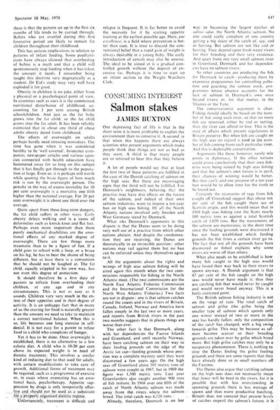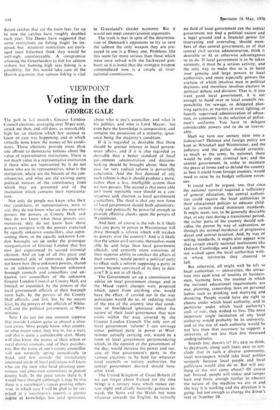CONSUMING INTEREST
Salmon stakes
JAMES BUXTON
One depressing fact of life is that in the short term it is more profitable to exploit the environment than to conserve it. A second is that when this happens there are always scientists who present arguments which make people think that things are not as bad as they seem. A third is that many people are so relieved to hear this that they believe it.
A lot of people would say that at least the first two of these patterns are fulfilled in the case of the Danish catching of salmon on the high seas. But there are encouraging signs that the third will not be fulfilled. For Denmark's neighbours, believing that the practice may have dire effects on the future of the salmon, and indeed of their own salmon industries, want to impose a ten-year ban on high seas fishing. Of all the North Atlantic nations involved only Sweden and West Germany stand by Denmark.
What irks Denmark's opponents in this dispute is that the Danes seem to be doing very well out of a practice from which other nations abstain. And despite the condemna- tion they are receiving, the Danes are theoretically in an invincible position: other nations may rail against them but no ban can be enforced unless they themselves agree to it.
All the arguments about the rights and wrongs of high seas salmon fishing will be aired again this month when the two com- missions responsible for fishing in the North Atlantic meet. (The two commissions are the North East Atlantic Fisheries Commission and the International Commission for the North West Atlantic Fisheries.) Two facts are not in dispute: one is that salmon catches round the coasts and in the rivers of Britain, Canada, Ireland, Norway and America have fallen steeply in the last two or more years, and reports from British rivers in the past two months suggests that in places things are worse than ever.
The other fact is that Denmark, along with her dependencies the Faeroe Islands and Greenland, and until recently Norway, have been catching salmon on their way to their feeding grounds on the edge of the Arctic ice cap—feeding grounds whose posi- tion was a complete mystery until they were discovered a few years ago. On the high seas off Greenland alone 305 metric tons of salmon were caught in 1967, but in 1969 the figure was 1,300 metric tons. Last year Greenlanders also caught another 900 tons of fish inshore. In 1968 over one fifth of the catch of North Atlantic salmon was made away, from the rivers. where the salmon:, breed. The total -catch was 6,528 tons. • Already, therefore, Denmark is on her way to becoming the largest catcher of saint° solar, the North Atlantic salmon. No
one could really complain of one country getting a big share of the catch of, say, cod or herring. But salmon are not like cod or herring. They depend upon fresh water rivers for their breeding and their very existence. And apart from one very small salmon river in Greenland, Denmark and her dependen- cies have no salmon rivers.
So other countries are producing the fish for Denmark to catch—producing them by expensive programmes for controlling pollu- tion and guarding the salmon stock, pro- grammes whose absence accounts for the lack of salmon in Denmark's own once fecund rivers; or, for that matter, in the Thames or the Tyne.
The conservationist argument is clear. Fishing should ideally be based on the num- ber of fish using each river, so that no more fish are removed, either by rod or netting, than the river can afford to lose. This is the state of affairs which present regulations in Britain preserve. But when fish are caught on the high seas no regard is paid to the num- ber of fish coming from each particular river. And this is deplorable conservation.
Arguments like these, however, rarely win points in diplomacy. 1f the other nations could prove conclusively that their own fish- eries were being ruined by high seas fishing and that the salmon's own future is in peril, their chances of winning would be better. But they can't; and one purpose of a ten-year ban would be to allow time for the truth to be found out.
Certainly the recoveries of tags from fish caught off Greenland suggest that about ten per cent of the fish caught there are of Scottish origin, and this would mean that in 1968 high seas fishing cost the Scots nearly 100 metric tons as against a total Scottish catch of 1,020 tons. But the movements of the salmon are mysterious; in the short time since the feeding grounds were discovered it has not been established which feeding grounds the fish from a certain river go to. The fact that not all the grounds have been discovered or fished explains why some rivers are worse off than others.
What also needs to be established is how many fish caught in the high seas would have found their way back to their rivers to spawn anyway. A Danish argument is that 65 per cent of the fish caught on the high seas would never have made it; thus they
are catching fish that would never be caught and would never breed anyway. This is a hotly contested point.
The British salmon fishing industry is not on the verge of ruin. The total catch of
salmon and grilse (the grilse being the smaller type of salmon which spends only one winter instead of two or more in the
sea) has hardly fallen; only the composition of the catch has changed, with a big swing towards grilse. This may be because as sal-
mon become scarcer so their breeding grounds are taken over by grilse which breed more. But high grilse catches may only be a temporary phenomenon. There is nothing to stop the Danes finding the grilse feeding grounds and there are some reports that they have already done so in small numbers off the Faeroes.
The Danes also argue that catching salmon on the high seas does not necessarily mean
that fewer will be bred in the rivers, for it is
possible that with less overcrowding in spawning grounds there is less wastage of spawn. and thus more productive hatching. Britaltuidoes hot contend that present'levels of catches imperil the salmon's future; it is
future catches that are the main fear, for up to now the catches have roughly doubled each year. The Danes have suggested that some restrictions on fishing might be im- posed, but whatever restrictions are envis- aged most fishermen think they would be well-nigh unenforceable. A compromise allowing the Greenlanders to fish for salmon inshore but banning high seas fishing is a possibility, for this would take care of the Danish argument that salmon fishing is vital
to Greenland's slender economy. But it would not meet conservationist arguments.
The truth is that in spite of the determina- tion of Denmark's opponents to try to save the salmon the only weapon they are pre- pared to use is a flimsy one. Problems like this seem far more serious than those which were once solved with the hackneyed gun- boat; so it is ironic that the strongest weapon contemplated now is a couple of inter- national commissions.



































 Previous page
Previous page